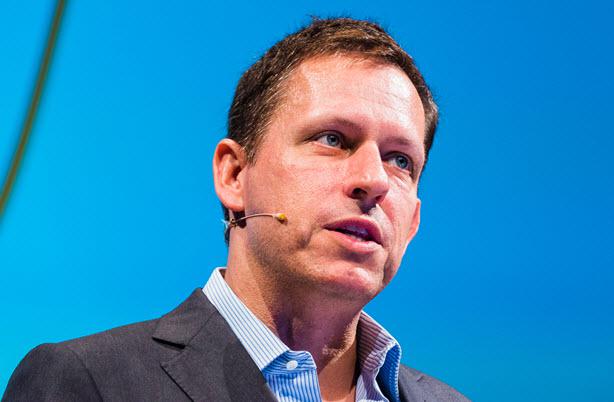How and Why Two Finance Geniuses Diverge So Wildly on Crypto
One of the more enduring characteristics of the meteoric rise of bitcoin and other cryptocurrencies is the polarizing nature of the debate surrounding them. There seems to be no clear middle ground on the issue—individuals are either shooting for the moon or expecting the market’s imminent collapse—touting the revolutionary features of blockchain while also predicting its swift obsolescence. The fragmented opinion on the matter is not wholly unexpected; cryptocurrency prices are known for their wild price swings and the relatively high number of unknowns that still surround the young technology.
Nowhere is this emerging dichotomy of opinion so pronounced as in the statements of some of the most prominent financiers and businesspeople in the world. Case in point is the disagreement of opinions between two of the bigger names in the business world today, Peter Thiel and Peter Schiff. Both are highly successful investors and businessmen of the highest acumen. Even so, they have fundamentally different opinions on the current state of the crypto market, as well as the direction it’s headed in. These two viewpoints are an excellent representation of concepts’ large-scale polarization.
The Bull Case – Peter Thiel and Bitcoin as Digital Gold
Known as a venture capitalist with a knack for picking winners ahead of the rest, Peter Thiel has made his fortune on big bets that gave major returns. He is perhaps best known for his early angel investment of $500,000 in then-fledgling tech project Facebook—a small sum that paid out many times its value. Moreover, he is a cofounder of PayPal, the firm that revolutionized online payment solutions and has become a staple of the current internet. This gives him some gravity in the crypto sector as well, and more frequently, his name has been appearing in the blockchain and crypto community due to his high optimism for its future.

In March 2018, Thiel made headlines when he declared that bitcoin was on its way to becoming the digital equivalent to gold, an asset that while not necessarily ideal for daily transactions is still an excellent store of value. In his eyes, bitcoin’s position as the largest first mover in the crypto market gives it an advantage, and he’s backed up his talk by instructing his Founder’s Fund to purchase between $15 and $20 million in bitcoin. While he has noted his skepticism about the rest of the sector, his recent actions show he remains convinced on the future of blockchain. Thiel recently made an undisclosed, but reportedly large, investment in blockchain-based firm Block.one, which is developing the EOSIO protocol.
Thiel’s Founder’s Fund invested in Tagomi Systems, a company that seeks to ease trades for big investors, allowing for bigger names in the traditional finance industry to start gaining exposure to crypto. Undoubtedly, while he has expressed some reluctance, this Peter is betting big that blockchain is the future.
The Bear Case – Peter Schiff on Bitcoin’s Inevitable Collapse
Peter Schiff has long been known for his expertise and foresight when it comes to the state of financial markets. A stock broker by trade and a founder of several financial services companies under the Euro Pacific umbrella, Schiff came into the spotlight with his early prediction of the housing and mortgage crisis of 2008. In recent years, Schiff has turned his attention to cryptocurrencies, and especially bitcoin, though not in any optimistic way. As opposed to Thiel—the “other Peter”–Schiff views bitcoin as “fool’s gold” and has gone as far as comparing the current craze for cryptocurrencies with the rush for Beany Babies in the 1990s.
In Schiff’s mind, the biggest issue with bitcoin (and other cryptocurrencies) is their lack of real-world value. He claims that bitcoin’s scarcity is artificially generated, unlike gold’s, which is based on its actual scarcity in the real world. Moreover, he sees a bubble that is still getting ready to burst, fueled by rampant speculation that is not supported by any real utility. In his opinion, bitcoin is still not used at all as a currency, but rather as a purely speculative asset and it has nothing substantial behind it. He has gone as far as predicting the price of bitcoin could fall to as low as $1,000 in the near future, a collapse that could lead it to being completely abandoned by its evangelists.
Which Peter is Right? Potentially Both
Despite the division of the issue, and the valid points made by both Peter Thiel and Peter Schiff, the reality is that both may be correct. Regardless of the original vision and goals of bitcoin to become a digital payments solution that would eventually replace fiat, it is used today mostly as a speculative asset. Very few merchants accept bitcoin (or other cryptocurrencies) as payment due to the significant limitations the technology has—high fees, long transaction processing times, and few transactions per second. It may therefore peter out eventually, no pun intended.
Even so, blockchain has started to emerge from cryptocurrency’s shadow, and could provide a way forward for the sector. In this sense, blockchain-based services could begin to give cryptocurrencies a real value and tangible applicability that the legacy cryptos—bitcoin and Ethereum—simply have not delivered. Bitcoin could, as Schiff predicts, still collapse soon; the currency’s abrupt crashes in the past few months are clear evidence of that. However, as Thiel’s investments in blockchain reveal, more big-time investors are throwing their support not behind bitcoin necessarily, but the technology that underlies it. Should blockchain show that it has staying power, the entire sector could be buoyed by an intrinsic value that is hard to scoff at.

